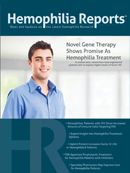Publication
Article
Hemophilia Reports
New Treatments for Secondary-progressive Multiple Sclerosis
In secondary-progressive multiple sclerosis (SPMS), patients show worsening gait disorder and ambulatory dysfunction that require the use of a cane, a walker, or a wheelchair. Treatment options for SPMS are limited, but several new therapies show promise.

The National Multiple Sclerosis Society Advisory Committee on Clinical Trials of New Agents in Multiple Sclerosis has defined secondary-progressive multiple sclerosis (SPMS) as “initial relapsing-remitting disease course followed by progression with or without occasional relapses, minor remissions, and plateaus.”1 A diagnosis of the relapsing-remitting form of the disease (RRMS), exemplified by relapses punctuated by periods of partial recovery, precedes the onset of SPMS. A recent study of 5778 patients found median time from onset to secondary progression of 21.4 years, which is consistent with other studies. 2,3 More than half of patients with RRMS go on to develop SPMS.1
In SPMS, patients show worsening gait disorder and ambulatory dysfunction that require the use of a cane (Expanded Disability Status Scale [EDSS] score 6), a walker (EDSS score 6.5), or a wheelchair (EDSS score 8.0).4 Treatment options for SPMS are limited, but several new therapies show promise.
Mitoxantrone. Mitoxantrone is the only treatment approved for SPMS in the United States. In a double-blind, randomized, multicenter trial, 194 patients with RRMS or SPMS were given 5 mg/m2 or 12 mg/m2 of mitoxantrone or placebo every 3 months over 24 months. Patients given the higher dose of mitoxantrone showed a reduced annual relapse rate, longer median time to first relapse, and improved EDSS.5 However, mitoxantrone’s use is associated with high rates of cardiomyopathy and delayed treatment-related acute leukemia, limiting its use.6
Interferon beta-1b. A double-blind, 3-year, multisite study conducted in Europe comparing interferon beta-1b (8 million IU given every other day, n = 360) with placebo (n = 358) in patients with SPMS showed a significant difference in time to confirmed progression in disability.7 Patients treated with interferon beta-1b showed delayed progression (by 9 to 12 months over 33 months of analyzed data) and reduced rate and severity of relapse. A similarly conducted study in North America showed a reduced relapse rate but found no treatment effect on progression,8 an effect that may be attributed to patients being in an earlier stage of progression.9
Interferon beta-1a. In a study conducted to determine whether this treatment slowed disease progression in the SPMS population, patients received 60 µg of interferon beta-1a or placebo once weekly. Patients treated with interferon beta-1a had a 33% reduction in relapse rate, improved MRI activity, and improved quality of life.10 A study testing the treatment in 618 patients who received a dose of 22 µg or 44 µg1 of interferon beta-1a or placebo did not show any effect on disability progression but showed significant improvement of exacerbation- related outcomes.11
Masitinib. Masitinib, a selective oral tyrosine kinase inhibitor, inhibits mast cell survival, migration, and activity.12 Thirty-five patients with primary-progressive MS (PPMS) or relapse-free secondary-progressive MS (rfSPMS) participated in a multicenter, double-blind, randomized, placebocontrolled phase IIa study assessing the safety and clinical benefit of masitinib (3 mg/day to 6 mg/day for 12 months, n = 27 ) versus placebo (n = 8).13 The primary endpoint of the study was change in MS functional composite (MSFC) score from baseline to 12 months. Masitinib-treated patients showed improved MFSC scores from baseline (+103% ± 189) while placebo-treated patients showed poorer MSFC scores (-1/N 60% ± 190) 12 months later. While both groups showed a similar frequency of adverse events, masitinib-treated patients showed more severe and serious adverse events (AEs). The authors of the study concluded: “The findings of the current study, within limitations inherent to such an exploratory trial, suggest that oral masitinib was relatively well tolerated and can be of therapeutic potential in the treatment of MS” and warrants a larger, placebo-controlled investigation.
Natalizumab. This therapy is a humanized monoclonal antibody and α4 integrin antagonist that prevents leukocyte migration.9 Patients with RRMS or SPMS were treated with natalizumab (2 IV infusions 4 weeks apart) or placebo in a randomized, double-blind trial.14 Natalizumab-treated patients had significantly less new active lesions (mean: 1.8 per patient) versus placebo (3.3 per patient) in the first 12 weeks of the study. A phase III, double- blind, placebo-controlled study investigating whether treatment slows the progression of disability in SPMS patients is under way.15
Rituximab. An observational study was conducted in which rituximab was given to 3 patients with SPMS for at least 15 months. There were no severe AEs and patients’ EDSS scores showed stabilization after increasing in previous years.16
The results of a small, retrospective, single-center study showed that disability scores for patients with SPMS who were treated with rituximab for 2 years stabilized or improved (in 21 of 25 participants, 84%). Christopher Perrone, a fourth-year medical student at the University of Massachusetts, Worcester, who presented this research, said of the findings: “In terms of implications for rituximab use in secondary-progressive MS, it remains an option for patients who do not succeed or have control of their disease on first- or second-line therapy.”17
A phase II/III study comparing rituximab and placebo in patients with SPMS to evaluate its safety and efficacy is now enrolling participants (ClinicalTrials.gov Identifier: NCT01212094). Statins. Statins inhibit the catalytic conversion of HMG-CoA to mevalonate, block adhesion molecule expression, and inhibit leukocyte migration through the blood-brain barrier, suggesting they may be effective in treating MS.18 In a randomized, phase II study, patients received simvastatin 80 mg (n = 70) or placebo (n = 70) for 24 months. Rate of atrophy was quantified and was lower in simvastatin- treated patients compared to placebo (0.288% vs 0.254 %). Simvastatin was well tolerated and treated patients had a similar number of serious AEs compared with placebo-treated patients. Jeremy Chataway, PhD, lead author on the study and consultant neurologist at the National Hospital for Neurology and Neurosurgery in London, said:
“Simvastatin is an ideal candidate drug for treating secondary MS—not just because of the results of this study and because of its well-known safety profile, but also it is a repurposed drug which may have a significant impact on reducing costs and increasing the chances of starting a phase III trial.”19
References:
1. Lublin FD, Reingold SC. Defining the clinical course of multiple sclerosis: results of an international survey. National Multiple Sclerosis Society (USA) Advisory Committee on Clinical Trials of New Agents in Multiple Sclerosis. Neurology. 1996;46(4):907-911.
2. Koch M, Kingwell E, Rieckmann P, Tremlett H, Neurologists UMC. The natural history of secondary progressive multiple sclerosis. J Neurol Neurosurg Psychiatry. 2010;81(9):1039-1043.
3. Rovaris M, Confavreux C, Furlan R, Kappos L, Comi G, Filippi M. Secondary progressive multiple sclerosis: current knowledge and future challenges. Lancet Neurol. 2006;5(4):343-354.
4. Wingerchuk DM, Carter JL. Multiple sclerosis: current and emerging disease-modifying therapies and treatment strategies. Mayo Clin Proc. 2014;89(2):225-240.
5. Hartung HP, Gonsette R, Konig N, et al. Mitoxantrone in progressive multiple sclerosis: a placebo-controlled, double-blind, randomised, multicentre trial. Lancet. 2002;360(9350):2018- 2025.
6. Marriott JJ, Miyasaki JM, Gronseth G, O’Connor PW. Evidence Report: The efficacy and safety of mitoxantrone (Novantrone) in the treatment of multiple sclerosis: Report of the Therapeutics and Technology Assessment Subcommittee of the American Academy of Neurology. Neurology. 2010;74(18):1463- 1470.
7. Placebo-controlled multicentre randomised trial of interferon beta-1b in treatment of secondary progressive multiple sclerosis. European Study Group on interferon beta-1b in secondary progressive MS. Lancet. 1998;352(9139):1491-1497.
8. Panitch H, Miller A, Paty D, Weinshenker B. Interferon beta- 1b in secondary progressive MS: results from a 3-year controlled study. Neurology. 2004;63(10):1788-1795.
9. Rommer PS, Stüve O. Management of secondary progressive multiple sclerosis: prophylactic treatment-past, present, and future aspects. Curr Treat Options Neurol. 2013;15(3):241-258.
10. Cohen JA, Cutter GR, Fischer JS, et al. Benefit of interferon beta-1a on MSFC progression in secondary progressive MS. Neurology. 2002;59(5):679-687.
11. Randomized controlled trial of interferon- beta-1a in secondary progressive MS: Clinical results. Neurology. 2001;56(11):1496-1504.
12. Dubreuil P, Letard S, Ciufolini M, et al. Masitinib (AB1010), a potent and selective tyrosine kinase inhibitor targeting KIT. PLoS One. 2009;4(9):e7258.
13. Vermersch P, Benrabah R, Schmidt N, et al. Masitinib treatment in patients with progressive multiple sclerosis: a randomized pilot study. BMC Neurol. 2012;12:36.
14. Tubridy N, Behan PO, Capildeo R, et al. The effect of antialpha4 integrin antibody on brain lesion activity in MS. The UK Antegren Study Group. Neurology. 1999;53(3):466-472.
15. Phase 3 Study of Tysabri for Secondary-Progressive Multiple Sclerosis. January 26, 2012. Accessed May 27, 2014.
16. Rommer PS, Patejdl R, Winkelmann A, Benecke R, Zettl UK. Rituximab for secondary progressive multiple sclerosis: a case series. CNS Drugs. 2011;25(7):607-613.
17. Rituximab is an option for secondary-progressive MS. http://www.youtube.com/watch?v=jQv8GEXWPCY.
18. Chataway J, Schuerer N, Alsanousi A, et al. Effect of highdose simvastatin on brain atrophy and disability in secondary progressive multiple sclerosis (MS-STAT): a randomised, placebo- controlled, phase 2 trial. Lancet. 2014.
19. Statins could hold key in battle against multiple sclerosis. March 19, 2014. Accessed May 27, 2014.






